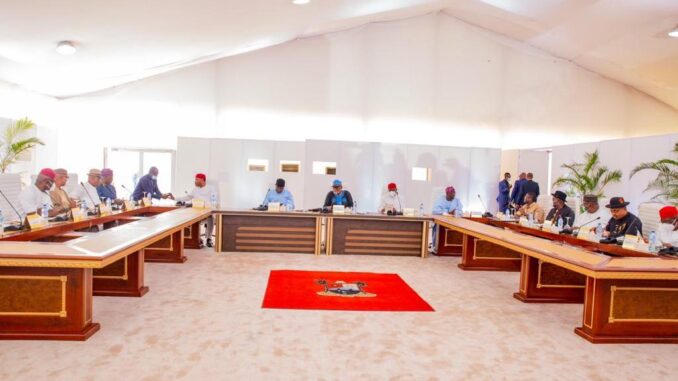
The dust raised by the Declaration of the Southern Governors to the effect that the next President of the country must come from the south is yet to settle. Opposition from groups in the core north of the country has continued to stream in. Coming on the heels of the hubris-laden statement from the Northern Elders Forum, that is, head or tail, the north must lead, is the one from a concourse of the northern governors and their traditional rulers. In their September 27 meeting in Kaduna, they noted that zoning the office of the President as called for by southern governors was against the provisions of the 1999 Constitution, as amended. That constitutional provision in Chapter Six (restated in Sections 133 (5) (a), Section 134 (1) (b) and (2) (b)) to the effect that the presidential candidate must have “not less than one-quarter of the votes cast at the election in each of at least two-thirds of all the states in the Federation and the Federal Capital Territory, Abuja.” In other words, any president to be elected must meet the constitutional requirements, which include scoring the majority votes, and polling at least 25 per cent of the votes cast in two-thirds of the 36 states of the Federation. Taking a cue from the northern governors’ forum, some groups of youths under the umbrella of Northern Youth Leaders Forum (NYLF) portrayed the southern governors’ demand for a southern president in 2023 as insensitive, offensive, and provocative. Besides, the demand betrayed their political naivety.
The opposition elements seem to ignore the fact that the point at issue is not a tea party affair but foundational crisis, which has stagnated the growth and development of the country. Sheer fixation to freebooting despite the enormous resources domiciled in each state of the federation will not help anybody anymore. As experts have argued, oil is the only singular expression of Nigeria’s linkage to the global political economy; and in this era of energy transition fixation to the proceeds of oil from a section of the country over which the control of the centre is attractive is sheer illusion. The earlier every section of the country gets down to the basics of nation-building through development and creation of wealth than the sharing mentality, the better it would be for national unity.
However, the argument about the constitutionality or otherwise of the call for power shift to the south in 2023, it is more or less about equity and social justice, which are adequately provided for by the deficient 1999 Constitution as amended. First and foremost, the Constitution does provide in clear terms for the zoning of the presidency to any part of the country. However, the constitution is not in opposition to it. Constitution as the grundnorm provides the instrument for navigating the political dynamics of the political community.
The goal of national unity in effect means the operationalisation of inclusivity and social justice as adequately provided for by the Constitution, which in practice has been brazenly undermined but only in convenient rhetoric. Section 14 (3) states expressly thus: “The composition of the Government of the Federation or any of its agencies and the conduct of its affairs shall be carried out in such a manner as to reflect the federal character of Nigeria and the need to promote national unity, and also to command national loyalty, thereby ensuring that there shall be no predominance of persons from a few state or from a few ethnic or other sectional groups in that government or in any of its agencies.”
The violation of this provision today writ so large that it does constitute a basis for impeachment of the president where the parliamentarians are truly representative of the popular will, namely, the people. Its activation on the road to restructuring will bear on the content and character of a new Nigeria.
As we argued in the 49th part of this serial, the state of the nation today requires brinkmanship and statesmanship to navigate. The Constitution itself has provisions for consociational measures. A concept first developed in western political philosophy by the Dutch, Arend Lijphart, is about mechanism for stability in societies with sundry cleavages. Thus, Consociational measures have merit in plural societies such as Nigeria that is highly fissiparous. Historically, the operationalisation of this concept has helped countries such as Austria, Belgium and the Netherlands among others to attain some degree of stability. Nigeria’s constitutional history has shown sensitivity to the country’s plurality. That sensitivity guided to a federal state structure that subsequent administrations in the country, especially the military have atomised. The federal character principle in the extant constitution as amended evinced in letter and spirit, the stabilising intent of the framers of the constitution. The deficit arose for those who think illusively that the Nigerian estate is their inheritance. Nigeria belongs to the peoples of this geographical space and so it must be governed with sensibility to their cultures and antiquarian autonomy. Federalism panders to these historical diversities, and perhaps, to its unity in diversity. That is why our leaders have a responsibility to listen to the resounding voices of reason on this beautiful political model called federalism, we lost to the ‘soldiers of fortune’ in 1966.
END

Be the first to comment